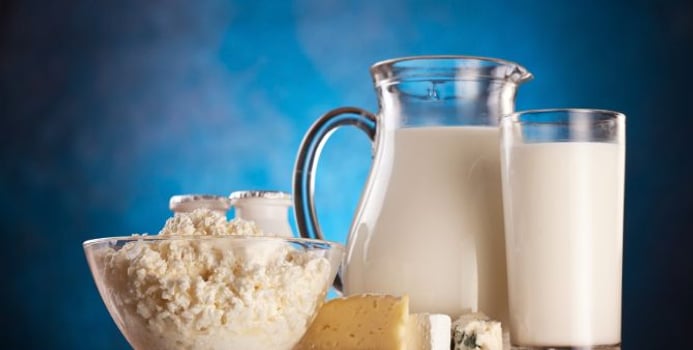Fat-free and low-fat milk are both low calorie foods rich in healthy vitamins and minerals, but some people chose to avoid dairy products. Luckily, they can easily substitute milk with other nutritious drinks.
Milk substitutes usually provide similar nutritional benefits as cow's milk. Typically, milk substitutes contain vitamins A, C, D and B12 in addition to calcium, iron, riboflavin and folate. Most commercial milk substitutes behave and react exactly like cow's milk, meaning you can easily swap any recipe that calls for milk with a milk substitute. Some substitutes, particularly soy and hemp milk, might even provide greater nutritional benefits than cow's milk.
Soy Milk
Soy milk is one of the more popular and well known milk substitutes. Soy milk is smooth and creamy with a slightly nutty flavor. Soy milk is an easy way to add some soy to your diet. The USDA recommends you consume 25 grams of soy protein a day to reduce cholesterol and your risk of developing heart disease. One cup of soy milk provides somewhere between 5 to 7 g of soy protein. Most supermarkets carry specialized soy milks, including vanilla, chocolate, unsweetened and reduced calorie.
Rice Milk
Rice milk is a common alternative to soy milk for individuals who are allergic or sensitive to soybeans. Many individuals find rice milk less palatable than soy milk because it's less creamy and has a predominant oat taste. Although rice milk is usually enriched with vitamins and calcium like soy milk, it contains more carbohydrates and calories than soy milk. This doesn't come as a surprise, as rice is a carbohydrate. For this reason, rice milk is perhaps a less nutritious milk substitute than soy milk.
Almond Milk
Almond milk is a nutritious milk substitute because almonds themselves are a healthy nut. Almond milk tastes slightly nutty like soy milk, but many people find almond milk to be creamier. Commercial unsweetened almond milk is lower in protein but also lower in fat and calories than soy milk. Almond milk is particularly popular among dieters because it's low calorie yet still quite creamy.
Hemp Milk
Hemp milk is a newer milk substitute that only recently became commercially available. The Omegas found in hemp milk are what really make it stand out as an excellent milk substitute. Most hemp milks contain 800 mg of Omega-3s and 2600 mg of Omega-6s per cup. Omega fatty acids are not common in other milk substitutes. Hemp milk's flavor and consistency are similar to almond milk.
Coconut Milk
Coconut milk should probably not become anyone's everyday milk substitute because it's naturally high in fat and calories. Some companies have recently developed coconut milk-based products that are low calorie and provide similar nutritional benefits as soy milk. Some people prefer coconut milk in recipes where they desire a coconut flavor or a creamy consistency.
Deciding which milk substitute is best for you is usually a matter of personal preference. The only milk substitute you might have to watch out for is rice milk, especially if you monitor your carbohydrate consumption.



